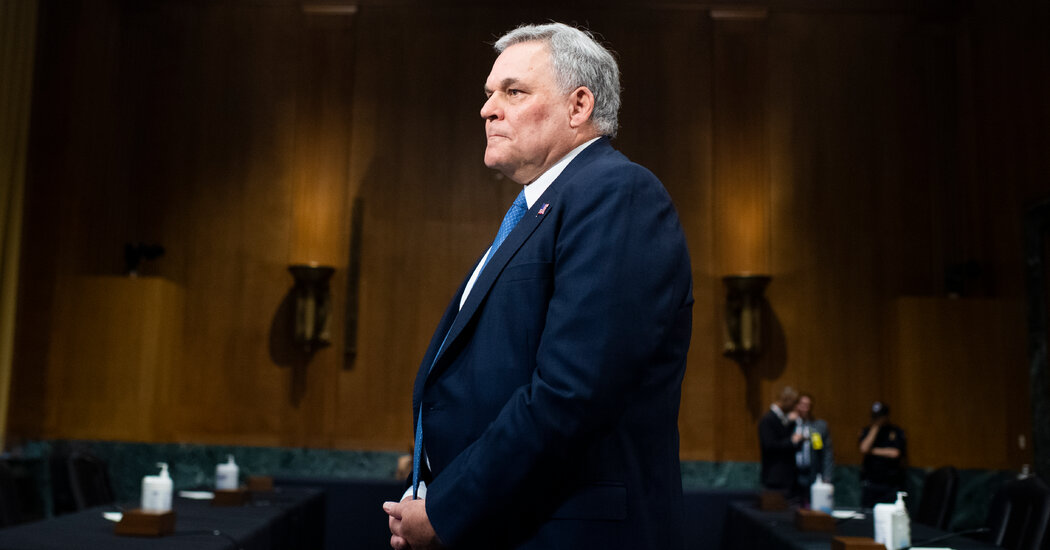WASHINGTON — The Internal Revenue Service is urging Congress to devote more resources to the agency as it plays an increasingly central role in the Biden administration’s efforts to prevent Russia and its oligarchs from evading punitive sanctions imposed on it. imposed by the United States.
Assistants to Charles P. Rettig, the IRS commissioner, told congressional staff on Wednesday afternoon that the agency’s criminal investigation unit, which has 3,000 employees, should grow about 40 percent over the next five years. It wants a net profit of about 1,300 after attrition. That could mean Congress must invest more than $5 billion in the agency, which is trying to oversee a comprehensive sanctions program and deal with avoidance tactics that have become more sophisticated as a result of the proliferation of digital assets.
The Biden administration is already looking to strengthen the overall IRS, including by trying to increase its budget by $80 billion over 10 years in a bid to tackle tax fraud. That attempt was met with resistance from Republicans, who have tried in the past to starve the agency of money. The Treasury Department, which oversees the IRS, has not previously indicated that money is needed for the Criminal Investigations Division.
In a report distributed to members of Congress and reviewed by The New York Times, the IRS said it needed additional resources because the criminal investigation team had been asked to assist in inter-agency efforts to enforce sanctions. in connection with the Russian invasion of Ukraine. The agency claimed investing in the division would pay off, noting that with its current annual budget of $600 million, it enabled it to identify $10.4 billion in tax fraud and financial crimes last year.
“The IRS is working with law enforcement agencies across the government and is already investigating Russian oligarchs and those facilitating the illicit movement of money or assets on their behalf,” the report said.
The IRS has been involved in more than 20 investigations related to money laundering by oligarchs since 2017, and is working with other law enforcement agencies to track down assets and seize property, the report said.
The IRS’s Criminal Investigations Division has a storied history; his agents have helped eliminate notorious tax fraudsters such as Pete Rose and Al Capone. Like the rest of the IRS, the unit has seen its budget run out in recent years. The size of the workforce has decreased by 25 percent in the past ten years.
In the past month, his task became much more complicated.
The United States has issued sweeping sanctions against Russia in response to its invasion of Ukraine, freezing its central bank assets, blocking transactions linked to major financial institutions and targeting top officials and oligarchs. Experts consider the sanctions the most robust ever to target a major economy, but they are also expected to lead to aggressive evasion measures by Russians.
IRS officials said they would use financial tracking technology and work with banks and international counterparts to track how oligarchs and others are shifting money and assets around the world in violation of sanctions. They are looking for signs of newly created fictitious companies that can be used to protect assets and transactions with cryptocurrencies, which criminals use to move money anonymously.
According to the report, the IRS seized $3.6 billion worth of stolen cryptocurrency last year and already surpassed it this year.
War Between Russia and Ukraine: Important Things to Know
Finding support for more money for the IRS won’t be easy. An agency official said Republicans had blocked a request for more funds for criminal investigations in the spending bill passed by Congress last week.
Mr Rettig will personally plead the case Thursday morning when he testifies before the House Ways and Means Committee.
“A strong, robust criminal tax enforcement presence provides a significant deterrent to those willing to evade their legal obligations to our country,” Mr Rettig will say, according to a copy of his prepared remarks. “Without adequate resources, we risk sending a much less powerful message to potential and active tax evaders.”

